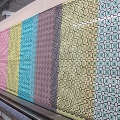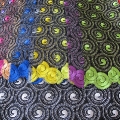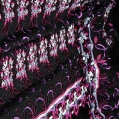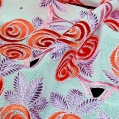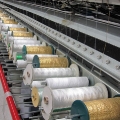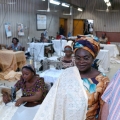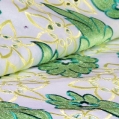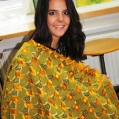Lagos Nigeria, the port city on the Gulf of Guinea is on the verge of being tagged the largest mega-city in Africa. Those who try their luck here, come from all over the country as well as neighboring states. They come in search of the “golden egg” or for their share of the “National cake”. Very few are able to manage the hustle.
In one of the suburbs around the International airport, Rudi Bösch sits in his office while supervising his embroidery production. It is not easy for him. Bösch is the last owner of the business who tries to update a remarkable history of Vorarlberg Austria as an African fabric product export country.
In the 1960’s, Nigeria recognized that Vorarlberg was capable of producing ideal materials for colorful national costumes. These fabrics are adorned during all major family events; baby naming and baptism, weddings, religious holidays such as Christmas, birthdays and funerals.
The 57-year-old can remember 25 embroidery producers from Vorarlberg, who then settled in Lagos. Whenever and wherever a grand celebration arises, the top products from Lustenau and surroundings are to be seen. That’s history now.
Despite the economic and social adversity in Lagos, Rudi observes that the country is flooded with cheap Chinese goods. He also complains secretly that he receives no help from the local banks. Rudi also documents that his customers do not always pay for ordered goods and regrets that Nigerians now have hardly any money for their celebrations.
Rudi, a typical stubborn Austrian does not give up so easily perhaps because he has fallen in love with this country and its people. He really has. After all, he is married to a Nigerian woman.
As the business diminishes through the years, Rudi Bosch is supported by his friend; Heinz König, an ordained Nigerian chief. In the small village outside of Lagos where the Lustenauer lived from 1976 for 18 years, they have named him “the Chief”; which means more than just a successful integration.
In retirement, Heinz says he was a little bit bored. And somehow as Chief he must look after his people’s affairs. He still knows how to work the old embroidery and sewing machines, which still run well at Rudi´s place. Since the foreman in the factory of Rudi still performs, there is no standing still anymore.
Is he the boss at home too? Mr. König smiles, and then he says proudly, “I think so, because otherwise my wife would not let me go.”
by Kurier reporters and translated by Silke Jurkowitsch in Austria for Trendy Africa Media.


